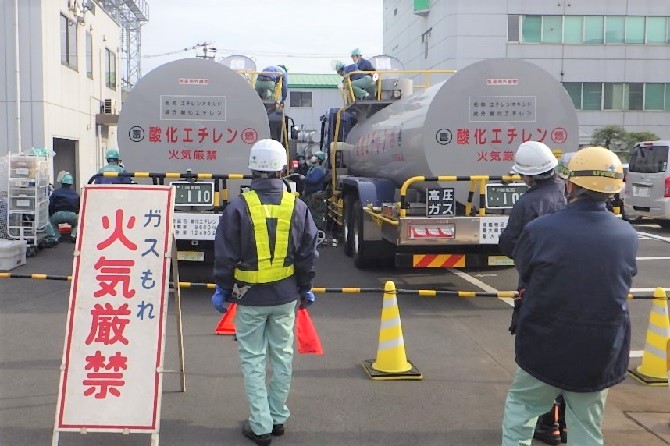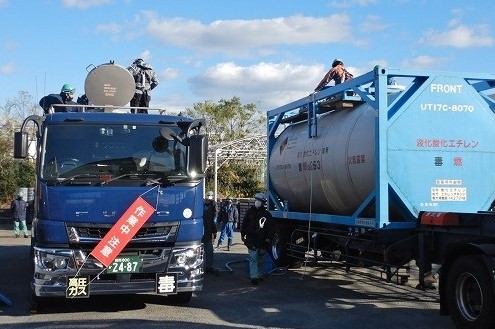Supply Chain Management
In our supply chain, from the procurement of raw materials to the manufacture, sale, use, and disposal of products, we are promoting various sustainable procurement initiatives with the aim of putting into practice our Group Mission “TechnoAmenity: Providing prosperity and comfort to people and society, with our unique technology”.
Sustainable Procurement Policy
The Nippon Shokubai Group recognize our suppliers as important partners, and we will build a relationship of mutual understanding and trust with them. We will also conduct fair and impartial business transactions in compliance with laws and regulations and with high ethical standards for the sustainable development of both parties.
With the cooperation of our suppliers, we will also promote sustainable procurement initiatives that take human rights and environmental preservation into consideration.
CSR Procurement Guidelines
The Nippon Shokubai Group are committed to sustainable procurement to fulfill our social responsibility throughout the supply chain. We strongly believe that the understanding and cooperation of our suppliers are indispensable in promoting such efforts. Based on this belief, we have compiled a set of CSR Procurement Guidelines that we invite our suppliers to collaborate on with our Group companies. These guidelines are published on our corporate website and distributed during our CSR supplier survey. We kindly request our suppliers to provide a written confirmation of their agreement with the guidelines. We also encourage our business partners to understand these guidelines and take appropriate actions.
NIPPON SHOKUBAI Group CSR Procurement Guidelines
Green Procurement Initiatives
Nippon Shokubai promotes initiatives to ensure supplies of safe and reliable products throughout the entire supply chain, from procurement of raw materials to manufacture and sales of products. In accordance with our regulations for green procurement management, we have independently assigned substances that are regulated or highly hazardous to two categories: “prohibited substances” and “restricted substances.” We are promoting the development of green products and the procurement of raw materials with low environmental impact while controlling the inclusion of such substances in our products. For information transmission sheets, we have introduced chemSHERPA*.
*chemSHERPA: This shared system for transmitting information about chemicals contained in products to supply chains was developed under the initiative of the Ministry of Economy, Trade and Industry in Japan. Full-scale utilization began in April 2018.
Responsible Procurement of Minerals Policy
To fulfill our social responsibilities, we continue to confirm that we do not procure so-called conflict minerals*. We continuously monitor the actual situations at our suppliers, and stop procurement promptly if the use of conflict minerals is discovered.
*Gold (Au), tantalum (Ta), tungsten (W), tin (Sn), and cobalt (Co) are mined under conditions of conflict, human rights violations, etc. and sold in the Democratic Republic of Congo and its surrounding countries, and CAHRAs (Conflict and High Risk Areas). Risks include Annex II risks of the OECD Guidance and global environmental impacts.
Conduct of CSR Supplier Survey
To promote sustainable procurement, we have been conducting CSR questionnaire-type survey of our major suppliers since fiscal year 2021. The survey takes place every 2 years, using the CSR Procurement Self-Assessment Questionnaire that is prepared by GCNJ (Global Compact Network Japan). By requiring suppliers to response to the survey, we are able to confirm whether they have conducted business activities in accordance with our “CSR Procurement Guidelines”.
In fiscal year 2023, based on the survey conducted during the year, significant suppliers (equivalent to 95% of raw material purchases) participated and responded from 96% of them. For suppliers whose response do not meet our company’s standards, we have conducted hearings to confirm their current situation of their activities and provided support for improvement, and confirmed that there are no serious issues. We will continue to strengthen cooperation with our suppliers and promote sustainable procurement initiatives.
Initiatives to Promote Responsible Procurement
We endeavor to steadily respond to human rights, labor practices, health and safety, environment and Fair Operating Practices in Nippon Shokubai and our group companies, while we also implement a variety of initiatives to ensure responsibility on the supply chain. We utilize Supply Chain Ethical Information Sharing Platform, such as Sedex*1 and EcoVadis*2 to disclose sustainability information. We have acquired RSPO*3 (Roundtable on Sustainable Palm Oil) certification.
*1 An online platform is organized by non-profit organization Sedex, for storing and accessing data regarding ethical and responsible business practices. Enterprises in the global 35 industries, including food, automobile, cosmetics and amenity over 180 countries and regions, have joined Sedex.
*2 The supply chain ethical information sharing platform is operated by the French CSR rating agency EcoVadis. The platform is used by over 130,000 multinational companies in about 180 countries.
*3 RSPO stands for Roundtable on Sustainable Palm Oil, a non-profit organization promoting the sustainable production and use of palm oil.
Logistics Initiatives
Nippon Shokubai outsources all logistics operations to Nisshoku Butsuryu Co., Ltd. The company works closely with the environmental safety and quality assurance divisions at the Himeji and Kawasaki Plants to ensure safety and quality and prevent accidents in logistics.
We regularly conduct drills for responding to accidents while products are in transit to make it possible to respond swiftly and minimize the damage in the rare occasions when such accidents occur.
We also endorse the White Logistics movement promoted by the Ministry of Land, Infrastructure, Transport and Tourism and others with the aim of realizing sustainable logistics. We issued our own White Logistics Declaration in April 2020 and have been implementing activities accordingly since then.

